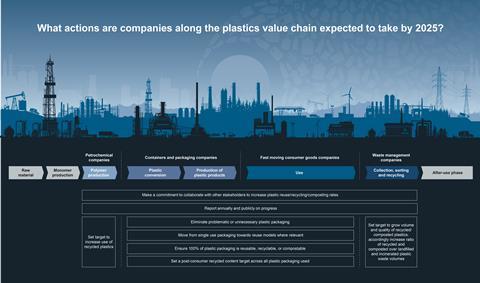By Rebecca Chapman, Specialist, Environmental Issues, PRI, and Gerald Naber, Programme Manager, New Plastics Economy, Ellen MacArthur Foundation
Plastic waste and pollution present an ever-evolving, systemic risk for investors. A circular economy for plastics—where plastic production is decoupled from fossil fuel use and all plastic packaging is reused, recycled or composted—is a solution to plastic pollution that is gaining support from companies, governments, and investors. But to realise this vision, much more urgent action, innovation and collaboration across the plastic value chain is needed, as well as active support and engagement from investors.
Until now, the role investors can play by engaging with companies along the plastic packaging value chain has not had a great deal of attention. To address this, the PRI has developed practical engagement guidance for investors, based on extensive research and inputs from the PRI’s Plastics Investor Working Group, and aligned with the Ellen MacArthur Foundation’s New Plastics Economy Global Commitment. The pioneering guidance will help investors ask companies the right questions about their activities in relation to plastic waste and pollution, assess their performance, and spur them to take bolder action towards a circular economy for plastics.
The risks of plastic pollution for investors
Global production and consumption of plastic has increased by more than 20 times since the 1960s. Plastic packaging accounts for about 45% of all plastic resin produced today, but only 14% of it is collected for recycling. While it has many benefits due to its light weight, durability and low cost, it is also responsible for around half of global plastic waste and pollution.
Plastic packaging accounts for about 45% of plastic resin produced today, but only 14% of it is collected for recycling
Exposure to plastic waste and pollution within an investor’s portfolio leads to many material ESG risks including existing and future regulatory changes, reputational issues, climate change, and issues resulting from pollution of waterways and oceans, such as marine degradation and biodiversity loss.
So far, action on plastic pollution has largely been driven by increasing regulation and public pressure. This scrutiny will continue to grow, in particular with two key UN conferences taking place later this year: the UN Biodiversity Conference in China, aiming to agree on a post-2020 global framework to prevent biodiversity loss, and COP26 in Glasgow, which will bring together governments to accelerate action towards the goals of the Paris Agreement. Tackling plastic pollution and reducing emissions associated with the use of plastic packaging are critically important elements of the global response to climate change and biodiversity loss.
The circular economy offers a solution pathway
In a circular economy for plastics, we eliminate the plastic we don’t need, innovate so all the plastic we do need is reused, recycled or composted, and circulate everything we use, keeping it in the economy and out of the environment.
Increasingly, companies, governments and investors are committed to such a transition, as demonstrated by the support for the New Plastics Economy Global Commitment, led by the Ellen MacArthur Foundation in collaboration with the United Nations Environment Programme (UNEP). Since 2018, the Global Commitment has mobilised over 500 signatories, including large FMCG and retail companies and several national governments, to work towards ambitious 2025 targets to create a circular economy for plastics.

Alongside the growth in the number and scale of voluntary commitments, we have seen rapidly evolving policy and regulatory frameworks which add further momentum to the circular economy transition. More than 100 leading companies from across the packaging value chain have called for the implementation of Extended Producer Responsibility (EPR) schemes for packaging, as a necessary part of the solution to packaging pollution.
Last year, the EU’s updated Circular Economy Action Plan introduced new legislative and non-legislative measures for a range of materials, including plastic packaging, and EU member states have since developed their own national strategies in line with the action plan. Supported by the Ellen MacArthur Foundation and WWF, a group of large businesses have called on the United Nations Member States to commit to the development of a global treaty on plastic pollution. Additionally the EU Taxonomy is currently developing criteria for economic activities that support the transition to a circular economy, including in relation to plastics.
How the engagement guidance can help investors
It’s vital that investors engage with companies in the plastic packaging value chain, to address plastic waste and pollution and drive action towards a circular economy for plastics. The new investor engagement guidance offers a practical framework for investors to use in their dialogues with corporates, focusing on four key sectors in the plastic packaging value chain: petrochemicals, containers and packaging, fast-moving consumer goods, and waste management.
Investors can use the guides to assess actions taken by companies on plastic pollution, and spur companies to take action, set ambitious targets and report on progress, towards a circular economy for plastics. The investor questions are designed to help investors ask companies from across the plastics value chain the right questions, regarding both their plastics management approach, and outcomes achieved to date. Investors can use the performance tables to assess companies’ strategies and actions to address plastic waste and pollution and support the creation of a more circular economy by 2025. They can also identify ‘good practice’ through the examples provided.
The PRI’s Plastics Investor Working Group will continue to enhance investor knowledge and understanding of how to address plastic pollution and support a circular economy for plastics this year by working collaboratively to deepen the insights within the guides, and explore key areas in more detail. To find out more about participating in this working group, please contact the PRI.
Spotlight on investor and corporate voices
Plastic waste and pollution present growing material risks to companies. These engagement guides will be a helpful tool for investors in engaging and evaluating companies’ performance in addressing and mitigating these risks
Caroline Boden, Director of Shareholder Advocacy, Mercy Investment Services
In particular the investor questions and performance assessments will allow us to target specific engagement outcomes on this theme quite quickly, which is useful given the achievements the Global Commitment Framework seeks by 2025
Piers Hugh Smith, Stewardship Officer- Climate & Environment, CCLA
Amcor is committed to making responsible packaging that protects products, society, and the environment. The PRI guide to Investor Engagement on Plastic Packaging sets a framework for investors to evaluate risks and opportunities across the plastic packaging value chain. The guide provides valuable insight about how investors can create value while keeping plastics in our economy and out of the environment. We appreciate the work by the team to develop the guide, and look forward to using the guide in our engagements with the investment community
David Clark, VP Sustainability, Amcor
The circular economy is a compelling solution to close the loop on plastics. Sustainable investments enable us to leverage the new recycling technologies, new processes and new business models that drive the transformation
Dr. Christoph Jaekel, Head of Corporate Sustainability, BASF
This blog post was first published in Environmental Finance
References
With thanks to Chronos Sustainability who co-authored the guides in collaboration with the PRI












